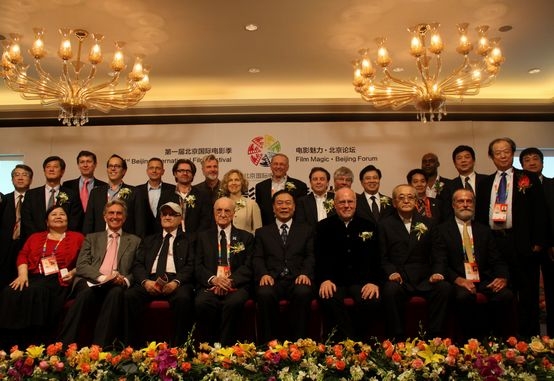Forum held for film festivals and city influence
Nearly two dozen chairpersons of prominent international film festivals participated in a forum on film festival and city influence Sunday at the inaugural Beijing International Film Festival (BIFF).
The unprecedented meeting featured 22 participants who discussed their perspectives on how international cooperation could help promote diversity in world cinema. They provided advice on how Beijing should run the BIFF in the future to turn it into a highly successful event.
 |
|
Twenty-two chairpersons from prominent international film festivals attend a forum on film festivals and city influence at the First Beijing International Film Festival on April 24, 2011. [CRI] |
Stefan Laudyn, Director of the Warsaw Film Festival, said he was thrilled to see the start of the BIFF. He said the fact that China was one of the fastest growing film markets automatically put Beijing on a different level. He quoted a line from Bob Dylan's song "The Times They Are A Changin'," saying Beijing would have a significant impact on cinema years from now.
Bailey Cameron from the Toronto International Film Festival showed a video advertising the Canadian city's film festival as a "pictures speaks louder than words" example of how to run a popular film festival. Aiming to find more areas of cooperation with China, he hinted at the possibility of the TIFF featuring new Chinese films. He also noted that the Oscar award-winning British film "Slumdog Millionaire" and the British historical drama "The King's Speech" both premiered at the TIFF.
Serge Losique, President of the Montreal World Film Festival who has visited China many times and knows many Chinese filmmakers, emphasized that Beijing's international film festival should seek its own personality to stand out among others. He said the BIFF was unique in that it had material support from the local government and the state media watchdog, the State Administration of Radio, Film and Television (SARFT), which was rare in other countries. He said this would lay a good foundation for the film festival to move quickly and more freely.
Other forum participants, including Marco Muller from the Venice International Film Festival, Lee Yong Kwan from the Busan International Film Festival and Jose Antonio from the Mar del Plata International Film Festival, gave speeches and shared their experiences with running film festivals.
The great number of film festivals held annually throughout the world all find it a challenge to become successful and noticeable. In Beijing, film has become an important part of urban culture given that the capital city, with its 3,000-year history and splendid modern appeal, has become the center of the Chinese film industry. The city and its cinematic culture have enjoyed constant and rapid development since the country's reform and opening-up began more than three decades ago.
For four consecutive years, Beijing has produced half of all Chinese feature films. Movies produced here attract about 27 million viewers each year and gross about 1.2 billion yuan in annual box office receipts. The amount accounts for 12 percent of annual nationwide box office earnings.
 0
0 






